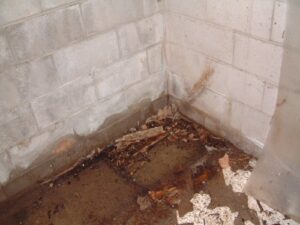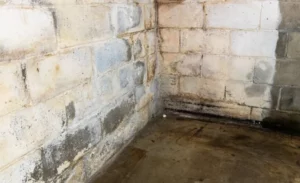A damp or wet basement can be a homeowner’s nightmare. Not only does it create an unpleasant environment, but it can also lead to significant damage to your home and possessions. If you’ve noticed water leaking onto your basement floor, it’s crucial to take immediate action to prevent further damage. In this article, we’ll explore the common causes of basement water leaks and provide practical tips on how to prevent them and safeguard your basement.
Common Causes of Basement Water Leaks
Before we delve into prevention strategies, let’s first understand the potential causes of water leaks in your basement:
Poor Exterior Drainage: Insufficient grading or improper landscaping around your home can lead to water pooling around the foundation. This can increase hydrostatic pressure and force water into your basement through cracks or gaps.
Cracks in Foundation Walls: Over time, the foundation of your home may develop cracks due to settlement, soil movement, or other factors. These cracks can provide a pathway for water to infiltrate your basement.
Faulty Gutters and Downspouts: Clogged or damaged gutters and downspouts can cause rainwater to overflow and pour down near your foundation, increasing the risk of basement flooding.
Inadequate Sealing: If your basement is not properly sealed or insulated, moisture from the ground can seep through the walls and floor.
High Water Table: A high water table can cause groundwater to rise, putting pressure on your basement walls and floor, which may result in water intrusion.
Plumbing Issues: Leaking pipes, faulty plumbing fixtures, or drainage problems can lead to water pooling in your basement.
Preventing Further Damage from Basement Water Leaks
Inspect and Repair Foundation Cracks:
One of the first steps in preventing further damage is to inspect your basement for any visible cracks in the walls or floor. If you find cracks, it’s essential to address them promptly. Depending on the severity of the cracks, you may need to fill them with epoxy or polyurethane injections or consider more extensive structural repairs with the help of professionals.
Proper Exterior Grading:
Ensure that the soil around your home is properly graded away from the foundation. The slope should direct water away from your house to prevent it from pooling around the basement walls.
Gutter Maintenance:
Regularly clean and maintain your gutters and downspouts. Remove debris, leaves, and dirt that can clog the system and cause overflow. Ensure downspouts direct water at least six feet away from your foundation to prevent water from pooling near your basement.
Install a Sump Pump:
A sump pump can be a valuable addition to your basement, especially if you have a history of water intrusion. It helps collect and discharge excess water away from your home, preventing flooding.
Interior Waterproofing:
Consider applying a waterproofing sealant or membrane to your basement walls and floor. This creates a barrier that prevents moisture from penetrating your basement’s interior.
Install a French Drain:
A French drain is an effective way to manage groundwater around your foundation. It consists of a perforated pipe surrounded by gravel and is installed below the basement floor level. The drain redirects water away from your home.
Address Plumbing Issues:
If you suspect that plumbing problems are causing water leaks, have a professional plumber inspect and repair any issues promptly.
Inspect for Mold and Mildew:
Regularly check for signs of mold and mildew growth in your basement. If you find any, it’s essential to address the underlying moisture issue and remove the mold to prevent further damage and health risks.
Install Dehumidifiers:
High humidity levels can contribute to moisture problems in your basement. Installing a dehumidifier can help maintain optimal humidity levels and prevent condensation and mold growth.
Regular Maintenance:
Lastly, ongoing maintenance is key to preventing basement water leaks. Inspect your basement periodically for any signs of water intrusion, and address issues as they arise.
Water leaking onto your basement floor is a serious issue that should not be ignored. Ignoring basement water leaks can lead to extensive damage, costly repairs, and potential health hazards due to mold and mildew growth. By understanding the common causes of basement water leaks and taking proactive steps to prevent further damage, you can protect your home and ensure that your basement remains a dry and safe space. If you’re unsure about the source of the leak or the appropriate preventive measures, consider consulting with a professional waterproofing expert to assess your situation and recommend tailored solutions. Remember that early intervention is key to preventing further damage and preserving the integrity of your home.
Contact the Professionals at Seal-Tite Basement Waterproofing Today! (703) 665-5589

Seal-tite Basement Waterproofing Co. is a full service basement environment contractor. We carry an A+ Better Business Bureau rating. We repaired over 40,000 homes and structures in Virginia, West Virginia, Tennessee, and North Carolina. We are fully insured and licensed. We have worked in all types of locations, including residential and commercial locations, government agencies, colleges, hospitals, churches, and condo associations.
Seal-tite® offers a lifetime transferable warranty. We carry a Class A Contractor’s License and we are fully insured. Our satisfied customers range from government agencies to businesses, hospitals, colleges, churches, and thousands of homeowners. Your home is probably the single largest investment you will make in your lifetime. Don’t wait, call Seal-tite® to help make your home dry, safe and livable.


 Call or email for a free estimate. For immediate help call
Call or email for a free estimate. For immediate help call  Start with trust. We’re BBB A+ Rated The Top Satisfaction Rate Awarded.
Start with trust. We’re BBB A+ Rated The Top Satisfaction Rate Awarded.